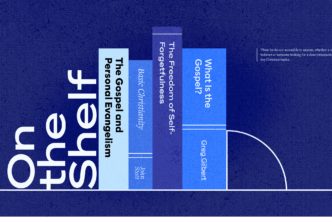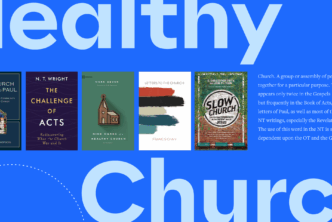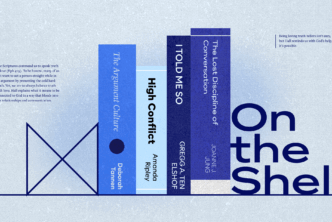Where do you go when the calamities of life feel too heavy? We’re all tempted to turn inward, but perhaps we would do better to open the Psalms of lament instead.
In the following excerpt from Christ and Calamity by award-winning author Harold L. Senkbeil, we see why—and how—to turn our complaints and cries toward God.
***
Have you ever noticed that when calamity strikes, after the initial shock wears off, our first thought is often, “Why me?” Somehow, we’ve gotten it into our heads that God’s job is to make us happy and keep us happy. After all, he’s God, isn’t he? And doesn’t God know everything? Doesn’t he know that our present predicament isn’t very pleasant?
Yes, he does. But what gave you the idea that the almighty Maker of heaven and earth is supposed to keep everything on an even keel? If you’ve read your Bible, you know that in the beginning, God created a good world; sin entered that world through one man, and death was the consequence. Now, like a deadly contagion, death has spread through all humankind, because all people sin (Romans 5:12).
God’s pristine creation—with no suffering, no death, and no destruction—is now long gone. This earth is still a delightful place to live. But everywhere we look, our beautiful world is filled with misery, hardship, sickness, calamity—and death.
Though, by God’s merciful grace, he works everything (even sorrow and pain) for the good of those who love him (Romans 8:28), the awful truth is that all misery comes from his gracious hand. God himself says so: “There is no god beside me; I kill and I make alive; I wound and I heal; and there is none that can deliver out of my hand” (Deuteronomy 32:39).
That sounds pretty harsh. I don’t like it any more than you do. My wife and my best friend both live every day with chronic pain, the result of injuries and health conditions. I would do anything to even briefly relieve their suffering for just an instant. But I can’t. And neither can you. That’s our frustration: some things in this broken world simply can’t be fixed, humanly speaking. It will do no good for us to whine about it. But there’s something else I can recommend.
Instead of whining, try lamenting.
***
Have you noticed that in the Bible’s hymnbook, the Psalms, roughly a third are songs of lament? You may know some of them by heart: “My God, my God, why have you forsaken me?” (Psalm 22). “Oh God, why do you cast us off forever?” (Psalm 74). “Why are you cast down, O my soul, and why are you in turmoil within me?” (Psalm 42). “Vindicate me, O God, and defend my cause against an ungodly people” (Psalm 43).[pullquote]
Like any loving father, God, in his mercy, invites us to come to him and talk. So like little children, we crawl into his lap by means of our lament, telling him exactly where it hurts and asking him for help.[/pullquote]
Psalms of Lament: How to file a complaint with God
These psalms of lament teach us how to file a complaint with God. And complaining isn’t whining; if you’ve ever read your medical records, you’ll know that medical complaints are simply the physical symptoms of your distress. When you go to your doctor, you’re not whining; you’re just explaining where you hurt. You list your complaints because you know your condition should receive attention. It may not go away; some of the symptoms may remain. But you’ve gone to someone who can do something about it.
Likewise, lamenting is calling God’s attention to what he already knows: you’re hurting, and it’s no fun. That miserable situation forces you to acknowledge that you aren’t a self-made person. You depend on God for your very life—but sometimes it takes a fearsome calamity to impress that dependence upon you and bring you to the point of lament. That lament is a cry of faith.
And so God in his grace invites you to complain—to bring your hurts and your miseries to him. It’s okay that these things feel too big for you; there’s no real way to cope with disaster and tragedy on your own. It’s important to not keep these troubles bottled up inside ourselves. Like any loving father, God, in his mercy, invites us to come to him and talk. So like little children, we crawl into his lap by means of our lament, telling him exactly where it hurts and asking him for help: “Turn, O Lord, deliver my life; save me for the sake of your steadfast love” (Psalm 6:4).
That’s the hard part, isn’t it: believing our God is gracious, even when tragedy strikes. We reason that if God is almighty, we shouldn’t be in this predicament in the first place. By all appearances, he either is unable to help or doesn’t care.
That’s why it’s essential at all times—but especially in the midst of tragedy—that we rely not on our own speculations but rather on God’s sure word. If we only draw on our experience of calamity, the steadfast love of the Lord will remain invisible. Looking at our pain and misery alone, we’re tempted to conclude that God is angry with us.
But God’s true perspective on human suffering is revealed not in our experience but in that of Jesus on the cross. There, God’s own beloved Son suffered in great agony of body, mind, and spirit as the sinless victim of our sin, in order that he might bring us to God (1 Peter 3:18). Crucifixion was a bloody, gory, anguishing mess. In the midst of his deep physical and spiritual agony, Jesus too felt that God was against him. From the cross, he cried out: “My God, my God, why have you forsaken me?” (Matthew 27:46).
In times of calamity, we have hope: Christ himself is with us in our misery, and his suffering sanctifies our pain. Because he was abandoned, we will never be. Because of Jesus, our Father in heaven wraps us in his embrace. Before it was finished on that dark Friday, before Jesus breathed his last, he committed his spirit into the hands of his loving Father in fervent faith (Luke 23:46).
Because of Jesus, you can be certain that you have a loving Father to whom you can turn to list your complaints and misery—just as he did on his cross. Even though you see no available remedy, you are not shouting into an empty void when you pray. Though you are in distress, you can place yourself—your body and soul and all things—into his care, believing that for Jesus’ sake, your Father in heaven fervently loves you and will see you through your present suffering.
Lamenting your hurt but trusting his cross-shaped love, you can confidently ask him to sustain you through all your days in faith-filled hope:
Return, O Lord! How long?
Have pity on your servants!
Satisfy us in the morning with your steadfast love,
that we may rejoice and be glad all our days.
Make us glad for as many days as you have afflicted us,
and for as many years as we have seen evil.
Let your work be shown to your servants,
and your glorious power to their children.
Let the favor of the Lord our God be upon us,
and establish the work of our hands upon us;
yes, establish the work of our hands!
(Psalm 90:13–16)
***
This article about the Psalms of Lament and what we can learn from them about turning our complaints to God is excerpted from Christ and Calamity by Harold L. Senkbeil.






